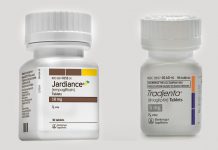Diabetes and depression are two major causes of premature death, especially when they occur together. Recently, some researchers have found that certain antidepressants may help reduce mortality risk in patients with diabetes.
According to the American Diabetes Association, more than 30 million people in the United States had diabetes in 2015.
When it comes to depression, the World Health Organization (WHO) consider it the leading cause of disability across the world. In 2017, more than 17 million Americans experienced one major depressive episode in 2017.
People who have diabetes are at increased risk of developing depression and only 25 to 50 percent of those with both the conditions receive treatment.
Study author Dr. Vincent Chin-Hung Chen, said, “The incidence of major depressive disorder [among] individuals with diabetes is significantly greater than the general population. Diabetes and depression each independently contribute to increasing total mortality.”
Dr. Chen and his team analyzed data from the Taiwan National Health Insurance Research Database. They identified over 53,400 people who were first diagnosed with diabetes and then with depression. Of all the participants, 50,532 used antidepressants.
The study was published in The Journal of Clinical Endocrinology & Metabolism.
The researchers found that as the daily dose of antidepressants increased, death rates decreased. They found that taking high doses of antidepressants on a daily basis was linked to a 35 percent reduction in mortality rate than taking low doses.
They also looked at the different types of antidepressants and compared the mortality risk. They found that taking a high daily dose of:
- norepinephrine-dopamine reuptake inhibitors (NDRIs) decreased mortality rate by 80 percent
- selective serotonin reuptake inhibitors (SSRIs) decreased mortality rate by 37 percent
- serotonin-norepinephrine reuptake inhibitors (SNRIs) decreased mortality rate by 42 percent
- mirtazapine decreased mortality rate by 40 percent
- tricyclic/tetracyclic antidepressants decreased mortality rate by 27 percent
- trazodone decreased mortality rate by 48 percent
On the other hand, those who took a daily medium dose of reversible inhibitor of monoamine oxidase A (RIMA) had an increased risk of mortality rate.
Dr. Chen explained that taking antidepressants may reduce inflammation and to some extent, death risk. Another speculation that he made is that antidepressants may reduce excessive blood clotting.
“Nearly 80 percent of diabetics die due to blood clot-related complications, such as heart attacks and stroke,” according to the American Heart Association.
However, the study has a few limitations. For example, the team of researchers have no information on the specific causes of death.
In fact, Dr. Chen pointed out that the findings may not hold true for people outside of Taiwan. Also, the team did not look at the death risk in those who did not take antidepressants.





















